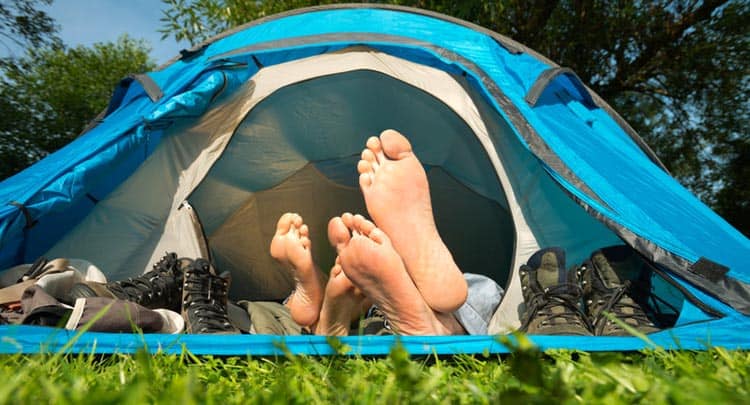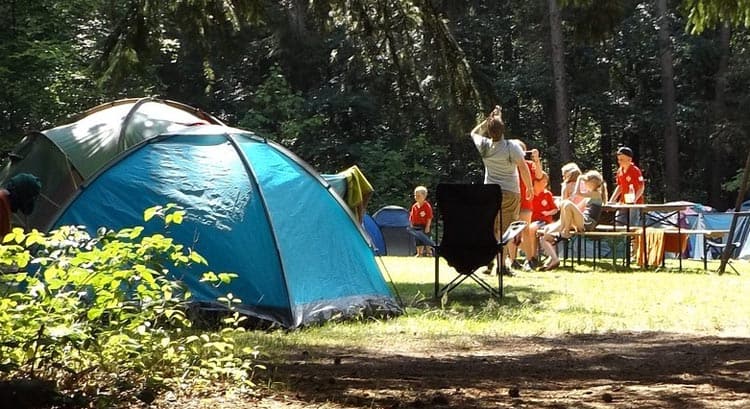Stinky tent? No Problem! In this article, I’m going to give you a few tips on how to clean a tent that smells and might even have mold growing on it. You’re even going to learn how you can prevent this from happening again.
If you discover that your tent smells, the best way that I’ve found to clean it is to soak it in a container filled with a mixture of lemon juice, distilled white vinegar, and water. This solution will totally eliminate any foul odors and even kill mold and mildew spores. If there are stains on your tent, a little scrubbing may be required.

Cleaning a tent that smells like old gym socks that have been sitting in a locker all summer long is no way to begin a camping trip! Hopefully, the tips that you learn in this article will make your smelly tent a thing of the past. Also, at the end of the article, we’ve also included a video showing the process of washing your tent from start to finish.
By the way, as an Amazon Associate, I earn when buying qualified products through links on my site.
This is a video of a really simple method to cleaning a stinky tent:
Tips for Cleaning a Tent That Smells

Prevention is Key
If you’re tired of cleaning your tent each and every time you take it out of storage, then you may want to think about and stop what’s causing the smell in the first place.
The most common reason that your tent stinks is because of moisture. You either packed it away while it was still damp, or stored it in a way that allowed moisture to seep inside its container (here’s a super hefty tote that you can store all your camping stuff on Amazon) container.
Keep in mind that just because it may not have rained during you’re camping trip doesn’t mean that your tent didn’t get wet. Chances are that before you woke up, it was covered in morning dew.
This little bit of moisture, if not allowed to completely dry, could be just the thing that triggers mildew or mold to begin growing on your tent, not to mention, cause of that musty smell that you hate.
Here are a few pointers for preventing odors:
- Purchase a tent footprint. This keeps your tent from getting damaged or from rainwater collecting beneath your tent.
- If it does rain or maybe there’s morning dew, try to give your tent a wipe down instead of waiting for it to dry or packing it up wet. If you do pack it up wet, unpack it and let it dry as soon you arrive at your next destination. Never forget to let it dry.
- Have a no food or shoes rule when going into your tent. This keeps crumbs and moisture from getting inside and being forgotten about. Moisture and food are the two things that would invite mold and mildew to grow inside of your tent.
- Once you arrive home, don’t just put your tent away. Make sure to clean your tent after every long trip. If you do mostly short trips, make sure to clean it at least once for each season that you take it out.
- Gently spot clean any dirty areas as soon as you can. This will make odors less likely to happen. And as always, make sure when you spot it clean, you give it plenty of time to dry.
Never Wash Your Tent in a Washing Machine
This should go without saying, however, I hate to admit that I tried this before just to see if it would work. In my defense, it was just an experiment and I did use an old tent for the test. I’ll just say that I wouldn’t advise it.
Although the tent that I used was old and not an expensive brand, I’m pretty sure the results would be the same no matter how good of quality the tent was. Tents are just not made for tumbling and spinning around in washing machines.
Should You Use Soap or Go All Natural
There are two ways to clean a tent. When I first started doing research on how to clean my tent, I found that you only want to wash it with a mild detergent soap. A lot of people were recommending dish soap. You don’t have to spring for the expensive stuff, the Dollar store brand will work just fine.
If you can opt for one that has a mild fragrance or even one that’s fragrance-free. It’s widely believed that fragrances can attract unwanted bugs, including mosquitoes, which is something you definitely want to avoid.
Another approach, is to use a non-chemical solution made up of vinegar, lemon juice, and water. After cleaning my tent several times, this is my preferred method. To me it just works better, not to mention, you save a little time since you don’t have to wash any suds away.
Handwashing Your Tent
If you’re tent is really dirty, you’re going to have to spend a little more time in getting it clean. This means that you’ll have to use a little elbow grease scrub the dirty areas with a soft, non-abrasive sponge. For this, I like to use a spray bottle.
Hand wash the outer fabrics and avoid scrubbing the underside of the tent fly as you can end up damaging the waterproof coating. Never scrub too hard, always be gentle with it since you could end up damaging your tent if you are too rough with it. Keep in mind when cleaning, that tents are easier to clean if you’re able to pitch it.
While they make chemical solutions for spot cleaning tough stains on tents, I still prefer using either soap and water, or the lemon juice and vinegar solution.
What if My Tent Has Mold or Mildew
If your tent was stored away and it was still even just slightly damp, there’s a good chance that mildew, or even worse, mold has formed on it. No problem!
You can use the same vinegar that you used for soaking your tent in. The only difference is you’ll want to pour the vinegar into a spray bottle (without diluting) along with some lemon juice and spray the problem areas. Let it sit for about an hour, then rub it clean with a soft sponge.
The acid in the vinegar and lemon juice will kill the mold or mildew spores, making your tent safe for use again (by the way, have you wondered if it’s even safe to sleep in a mildewy tent? Check out our article here, and we address that. )
The other option is to use a mildew and mold stain remover such as Starbrite. (Amazon)

How to Store Your Tent Properly
Smelly tents are a campers nightmare, especially if they have mold growing on them. The best way that I’ve learned to prevent this from happening, is to make sure your tent is completely dry before storing it.
When I pack my tent up at the campsite and load it up, that’s not my way of storing it for the winter!
Once I get home, I give it a good wash and allow it to dry in the sun, assuming the weather cooperates. If the weather is not so good, I’ll put up the tent in my garage and allow it to dry for at least 24 hours, sometimes longer before I pack it up for good.
Once I feel confident that it’s dry, I pack it in a plastic container like the Plano Sportsman’s 108 qt Storage Trunk.
Also, if you’re going to be storing it in a place that’s prone to moisture, such as an attic, basement, or outside shed, it’s a good idea to throw in a couple of Arm & Hammer baking soda bags to help control the moisture.
For the times that your tent’s not being used, this will not only prevent it from stinking, but will also help to prevent mold from growing on it.
Conclusion
I’m pretty sure that all of the tips in this article are safe for 99.9% of all tents being sold today. However, make sure that you read your tent manufacturers cleaning instructions before cleaning your tent, especially if you plan on using any type of chemicals!
Having to clean a tent that smells is not much fun, especially if you have to do it before a much anticipated camping trip with the family. You have enough to do in getting ready for the trip without this extra chore.
The good news is that with a little extra work at the end of each trip, you can prevent the hassle of having to clean a smelly tent every time that you take it out of storage.


